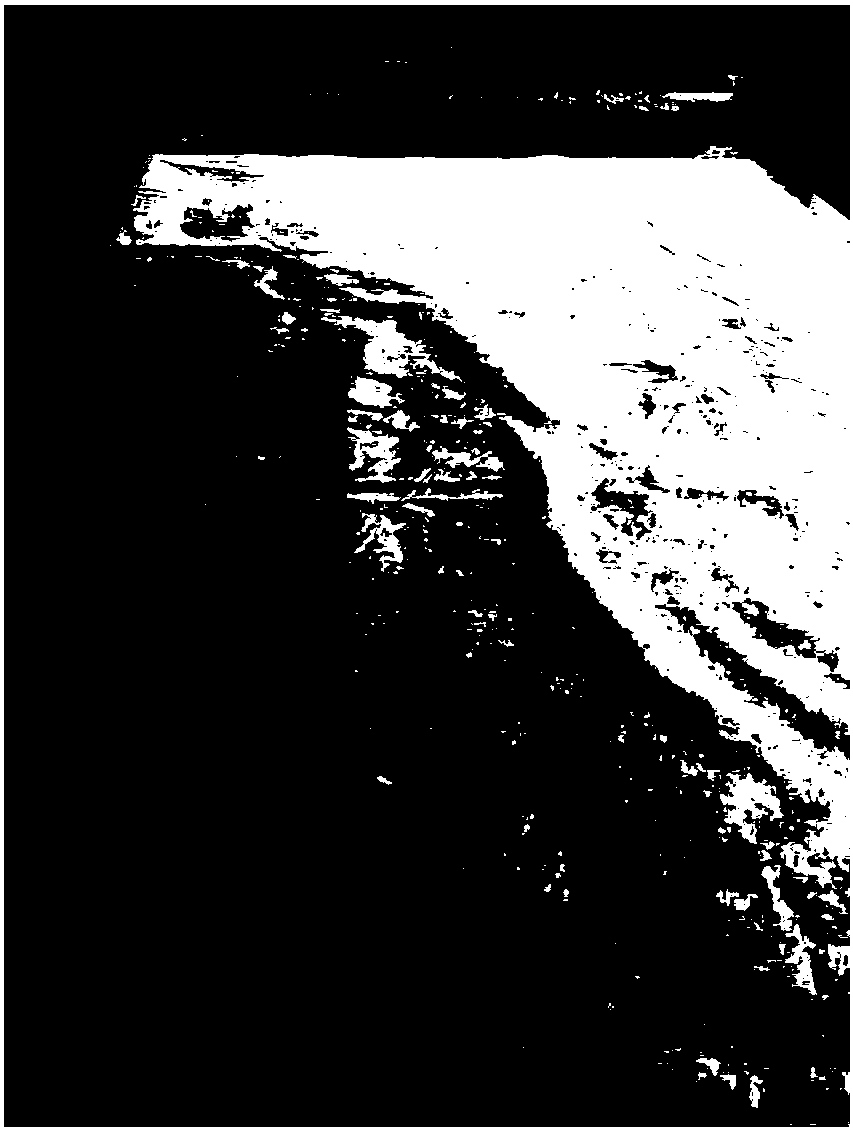Titanium oxide fiber paper for cryogenic insulation and its preparation method and application
A low-temperature cryogenic, titanium oxide technology, applied in chemical instruments and methods, inorganic fibers/sheets, papermaking, etc., can solve problems such as unreported industrial production of titanium oxide fiber paper, achieve low outgassing rate, radiation resistance and heat insulation High performance and versatile effects
- Summary
- Abstract
- Description
- Claims
- Application Information
AI Technical Summary
Problems solved by technology
Method used
Image
Examples
Embodiment 1
[0041] Embodiment 1, the preparation of titanium oxide fiber paper
[0042] (1) The rutile phase titanium oxide fiber with a diameter of 0.3-2.0 micron is cut into short shreds by 1mm length for subsequent use;
[0043] Put the chopped strands into pure water and white water, add a binder (water glass), and stir for 24 hours to disperse evenly to obtain a slurry with a mass concentration of 0.03%, which is set aside;
[0044] (2) Pump the prepared slurry to the headbox, and evenly distribute it on the polyester forming net after entering the headbox through a steady flow, and form a wet paper sheet on the net;
[0045] Carry out vacuum filtration for the wet paper, control the suction pressure at 0.2-0.5MPa, and further squeeze through the press roller, control the humidity of the wet paper not higher than 85%;
[0046] The wet paper is transferred to the composite aluminum foil through a nylon roller, and the thickness of the aluminum foil is about 0.006mm;
[0047] The zir...
Embodiment 2
[0050] Embodiment 2, the preparation of titanium oxide fiber paper
[0051] (1) Cut the rutile phase titanium oxide fiber with a diameter of 0.5-2.3 microns into chopped strands according to the length of 2mm for future use.
[0052] Put the chopped strands into pure water and white water, add a binder (water glass), and stir for 24 hours to disperse evenly to obtain a slurry with a mass concentration of 0.04%, which is set aside;
[0053] (2) Pump the prepared slurry to the headbox, and evenly distribute it on the polyester forming net after entering the headbox through a steady flow, and form a wet paper sheet on the net;
[0054] Carry out vacuum filtration for the wet paper, control the suction pressure at 0.2-0.5MPa, and further squeeze through the press roller, control the humidity of the wet paper not higher than 85%;
[0055] The wet paper is transferred to the composite aluminum foil through a nylon roller, and the thickness of the aluminum foil is about 0.006mm;
...
Embodiment 3
[0059] Embodiment 3, the preparation of titanium oxide fiber paper
[0060] (1) Cut the rutile-phase titanium oxide fiber with a diameter of 0.8-2.5 microns into chopped strands according to the length of 3 cm for future use.
[0061] Put the chopped strands into pure water and white water, add a binder (water glass), and stir for 24 hours to disperse evenly to obtain a slurry with a mass concentration of 0.05%, which is set aside;
[0062] (2) Pump the prepared slurry to the headbox, and evenly distribute it on the polyester forming net after entering the headbox through a steady flow, and form a wet paper sheet on the net;
[0063] Carry out vacuum filtration for the wet paper, control the suction pressure at 0.2-0.5MPa, and further squeeze through the press roller, control the humidity of the wet paper not higher than 85%;
[0064] The wet paper is transferred to the composite aluminum foil through a nylon roller, and the thickness of the aluminum foil is about 0.006mm;
...
PUM
| Property | Measurement | Unit |
|---|---|---|
| diameter | aaaaa | aaaaa |
| thickness | aaaaa | aaaaa |
| thickness | aaaaa | aaaaa |
Abstract
Description
Claims
Application Information
 Login to View More
Login to View More - R&D
- Intellectual Property
- Life Sciences
- Materials
- Tech Scout
- Unparalleled Data Quality
- Higher Quality Content
- 60% Fewer Hallucinations
Browse by: Latest US Patents, China's latest patents, Technical Efficacy Thesaurus, Application Domain, Technology Topic, Popular Technical Reports.
© 2025 PatSnap. All rights reserved.Legal|Privacy policy|Modern Slavery Act Transparency Statement|Sitemap|About US| Contact US: help@patsnap.com


